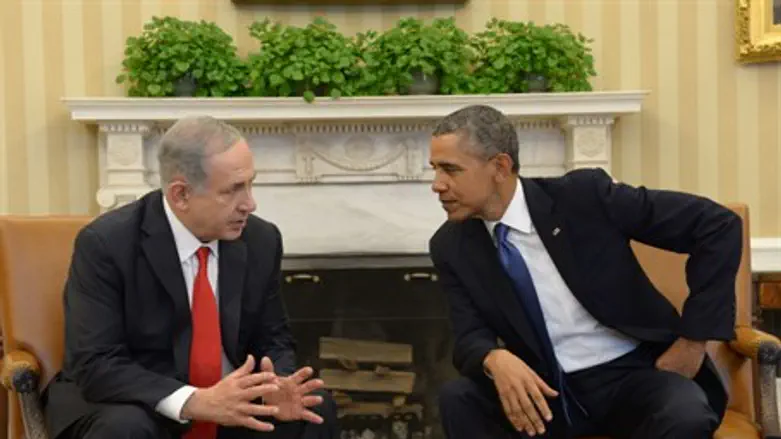
The follow-up - or the fallout - from Prime Minister Binyamin Netanyahu's Congress speech has only just begun, and the day after the speech, it remains to be seen how much public and Congressional pressure will come to bear on US President Barack Obama to toughen the American negotiating position with Iran.
In the meantime, are US-Israeli ties irrevocably damaged at the cabinet level?
Dr. Max Singer of the Begin-Sadat Center for Strategic Studies tells Arutz Sheva that it is still ultimately is policy rather than personality that decides the direction of bilateral relations.
“It’s always combined. But it is true that someone who is not from that camp (the right wing) will be less unattractive to Obama," Singer said.
He stated that beyond whatever personal animosity exists between Netanyahu and Obama, it will be a matter of how the next government formulates policy that decides the direction of cordial relations.
Some on the Israeli right contend Netanyahu is getting ready to offer the primary partnership in a national unity government to the left-wing "Zionist Camp" of Labor and Hatnua to put a fig leaf on his policies, but Singer is not convinced it will work to improve US-Israeli ties.
“Superficially it might work. There will be a big fuss over having a new, responsive and peace-loving government. But if Labor begins saying that Israel has different views with the United States, then the problems will come right back," he noted.
The worry seems to be that even if Netanyahu wins reelection and immediately does try to form a national unity government, he will not be able to so easily negotiate with the Obama Administration on policy vis-à-vis the Palestinian Arabs. After six years of hostility between the two heads of state, the onus might fall on Israel to prove itself.
Boehner vs. Obama
A new question emerging from the battle over Netanyahu’s speech is whether or not Congress will take the lead in facilitating the US-Israel relationship. What clouds that question though is how assertive the Republican-led Congress will be with the President.
Do Republican House Speaker John Boehner and the Republican-controlled Congress have a shot at challenging the Administration’s policies or pushing sanctions legislation right now?
According to Singer, "it is not unprecedented for Congress and the President to have disagreements on foreign policy issues. But I do not know if Congress will have the strength to challenge the White House."
“It depends on how large a coalition they can form to support it (sanctions legislation). Boehner’s invitation to Binyamin Netanyahu might make a difference, but we have to see how Democrats on the borderline move and if they move with the Republicans on it," he added.
The Rules of Diplomacy
One of the more fundamental contentions about the speech is that it broke diplomatic protocol, but Dr. Singer does not agree.
Asked if Israeli Ambassador Ron Dermer would have to be replaced over the squabble, he said simply "no."
“The Prime Minister's speech did not break diplomatic protocol. The deviation from traditional practice was that the invitation to a joint session was issued by the Speaker without having sought agreement from the House minority. And contrary to initial reports, the President was notified of the invitation before it was issued to the Prime Minister," he noted.
On the other hand, he can see it being a deviation from the norm that a foreign leader disagreed so bluntly with a major Administration policy in front of a joint session of Congress, in the way Netanyahu opposed the Iran nuclear deal being formulated.
That might be something new, but it remains to be seen if it will set a precedent in how an opposition Congress deals with the President.